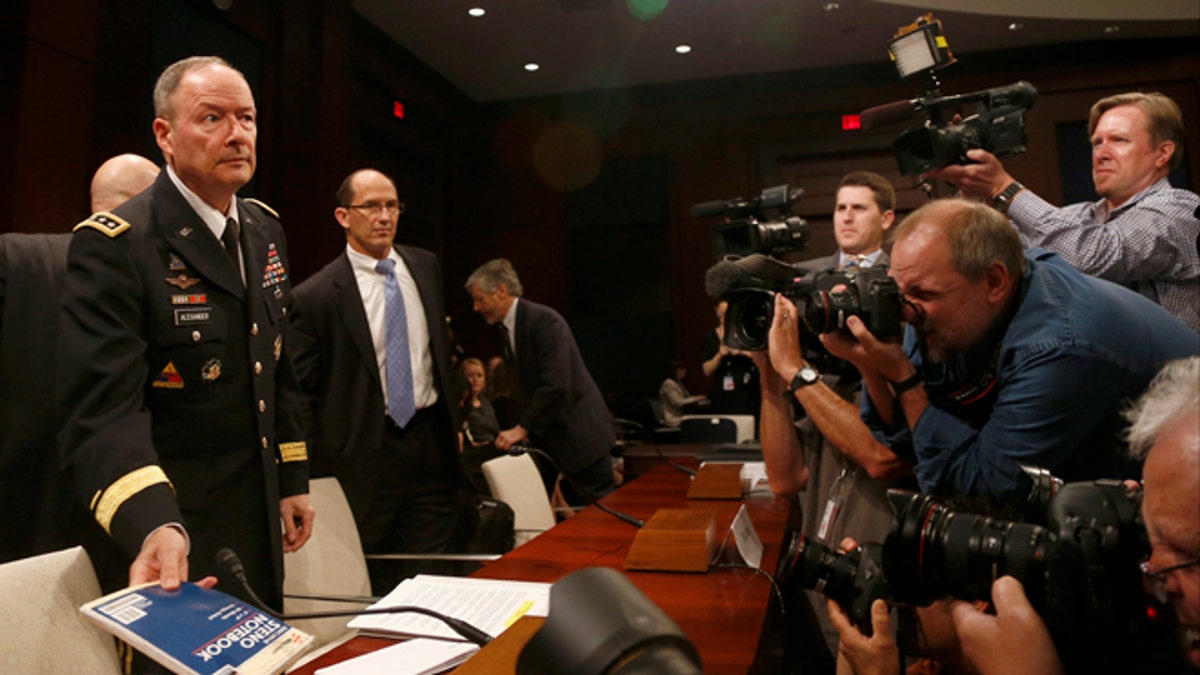
June 18, 2013: From left: National Security Agency Director Gen. Keith B. Alexander; Deputy FBI Director Sean Joyce; and Robert Litt, general counsel to the Office of the Director of National Intelligence arrive on Capitol Hill in Washington. (AP)
The National Security Agency and Justice Department mounted a vigorous defense of the government's controversial surveillance efforts on Tuesday, with NSA chief Gen. Keith Alexander claiming they have helped prevent "potential terrorist events" over 50 times since 9/11.
Officials insisted the programs protect Americans from unwarranted intrusion, as they began to shed light on the scope of the secretive effort in a rare public hearing.
Disclosing new details, a top FBI official claimed the surveillance efforts helped disrupt a plot to bomb the New York Stock Exchange. FBI Deputy Director Sean Joyce said NSA officials discovered the scheme while monitoring a known extremist in Yemen, who was in contact with an individual in the U.S. After initiating surveillance, Joyce said, they were able to detect "nascent plotting" to bomb the stock exchange and ultimately disrupt the plot.
Joyce also discussed another case in which the NSA used the program to tip off the FBI about an individual's "indirect contacts" with terrorists overseas. This "terrorist activity" was disrupted as well, he said, without going into detail.
The administration had not previously discussed those two cases. Joyce also confirmed prior claims that the program helped detect information about the 2009 plot to bomb the New York subway system and a plot involving a Chicago resident to bomb a Danish newspaper.
It's unclear whether authorities might have been able to disrupt these plots without the help of the phone- and Internet-record collection programs. But Alexander staunchly defended those programs against mounting criticism, pushing back after a string of reports based on leaks of classified information raised widespread privacy concerns.
Alexander, speaking before the House intelligence committee, said the programs "have protected the U.S. and our allies from terrorist threats across the globe," pointing to the intelligence community's ability to better connect the dots as a reason why there hasn't been another 9/11-style attack.
Specifically, he said they helped prevent terror "events" more than 50 times in more than 20 countries since 2001. Alexander said he plans to provide details on all the cases to lawmakers in a classified setting on Wednesday.
The session involving two of Washington's most secretive bodies comes as an NSA leaker, former contractor Edward Snowden, threatens to reveal more government secrets from his hiding spot in Hong Kong.
Alexander has already gone to Capitol Hill several times since Snowden revealed details earlier this month about the government programs to discuss the agency's budget and meet privately with congressional members. But Tuesday's meeting marked the first time Alexander has spoken publicly about the agency-led surveillance programs.
Some lawmakers, and many civil liberties groups, have complained that these programs have given the government too much power to monitor people around the world.
Alexander, though, said the program "does not compromise" privacy and civil liberties.
Committee Chairman Mike Rogers, R-Mich., echoed the comments, claiming incomplete information has been leaked that creates an "inaccurate picture" of the program.
Deputy Attorney General James Cole tried to offer a point-by-point rebuttal of the criticism. He stressed that authorities, when they gather phone records, cannot immediately find out the identity or location of the callers. Further, he said "we don't listen in on anybody's calls."
He said only certain people have access to the information, while saying the so-called toll records are not protected by the Fourth Amendment. He said the courts have found people cannot have a reasonable expectation of privacy as to who and when they call.
Further, he said authorities can only target people who are non-U.S. citizens and non-permanent residents, and those who are overseas.
The meeting comes one day after Snowden, the former NSA contractor who gave the classified documents to journalists, conducted an online chat for The Guardian in which the self-proclaimed whistleblower wrote: "Truth is coming and it cannot be stopped."
Among the most pressing questions now are which programs and how many of them either compile phone or email records or allow analysts to eavesdrop on conversations or read electronic messages.
Attorney General Eric Holder said Friday the leaks were "extremely damaging" and vowed that the person responsible would be held accountable.
However, he did not mention Snowden by name or say formal charges have been filed, saying only that the case is under investigation. President Obama said in an interview with PBS that the case has been referred to the Justice Department for investigation and "possible extradition."




